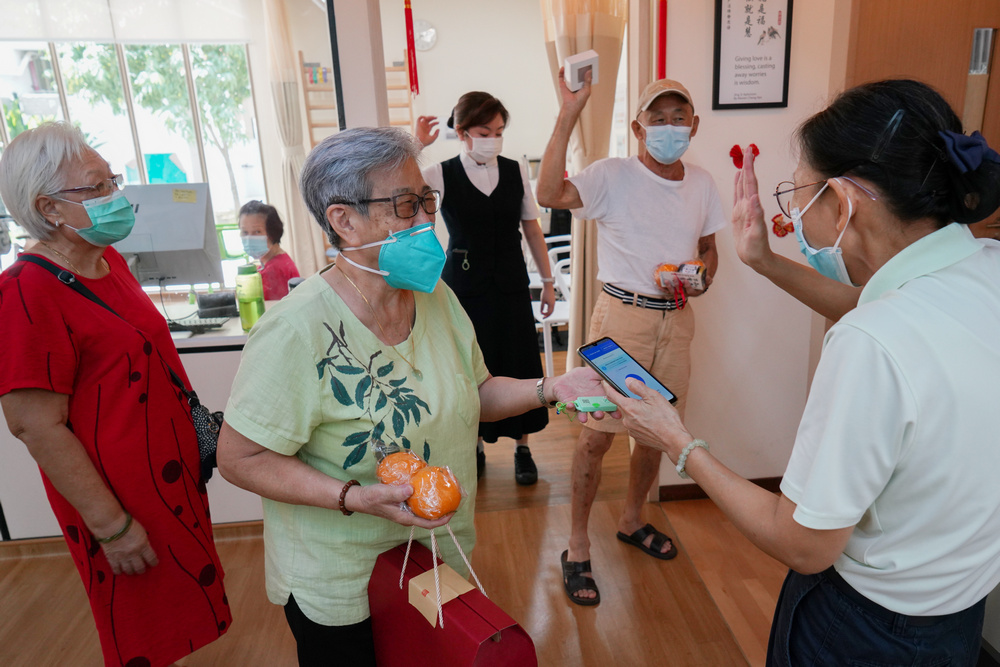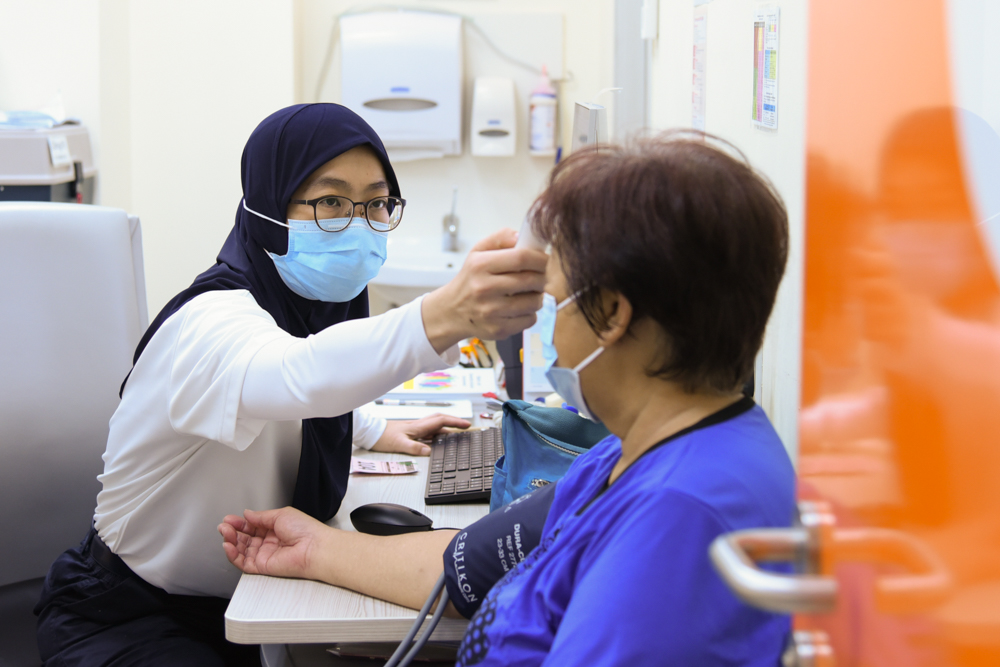
Lakeside Family Medicine Clinic plays a front line role in the community in assisting in the screening of COVID-19 and providing long-term care for elderly patients with chronic diseases. It has put up a brave front to maintain the medical capacity of Singapore.
"Hello Ah Ma, I'm Dr Tan. How are you?"
On a Friday afternoon, Dr Tan Chun Yeal, a Lakeside Family Medicine Clinic doctor, smiled and greeted an elderly lady in Hokkien through his mobile phone. The old lady has a mobility problem and was accompanied by his English-speaking granddaughter. It was telemedicine at play.
Since the morning, Dr Tan had been extremely busy, shuttling back and forth between two consultation rooms. After seeing a few patients, he quickly donned a full set of personal protective equipment (PPE) and hurried to the other consultation room to conduct an antigen rapid test (ART) or a polymerase chain reaction (PCR) test for patients with acute respiratory symptoms or who self-tested positive at home. After the swabbing, he immediately rushed to the other consultation room to see other patients.
Doing telemedicine and collecting nasopharyngeal swab samples for elderly patients have become Dr Tan’s daily routine during the pandemic. This was unimaginable before the pandemic.
Most of the patients who visit Lakeside Family Medicine Clinic are elderly patients with chronic diseases. Amid the pandemic, they are the most vulnerable group with the highest risk of infection and most likely to suffer and succumb to the virus. Therefore, although Lakeside Family Medicine Clinic may not be on the front line battling the pandemic like hospitals, it has put up a strong defence in the community for the past two years. It has undertaken the tasks of triage, assessment and referral, and long-term care of elderly patients with chronic diseases. To the best of its ability, it has supported Singapore in its endeavour to maintain sufficient medical capacity.
Impact of Omicron: The struggles of community primary care
Patients who visit the clinic would be asked if they have any acute respiratory symptoms and accordingly directed to the correct zone. The entire clinic is demarcated, and directions are laid out visibly, be it registration, waiting, consultation, screening, payment or medicine collection. Duties are assigned unambiguously, and there is no unnecessary gathering and movement of people. Though the flow of people was constant, the atmosphere was calm and without any irritation.
But in reality, the situation is unprecedented. Every staff member, including doctors, nurses, front desk staff and cleaners, told the journalists that the Omicron coronavirus strain has caused a surge in community cases and resulted in an immeasurable workload for them. It has exerted a heavy toll, and everyone was hectic and frenzied. Dr Tan said: "I have been so busy after the Chinese New Year. Every day is like a race!"
In August 2021, the Singapore government changed its pandemic strategy to seek “coexistence with the virus". After half a year, more people have completed their booster shots and gradually grown accustomed to performing self-tests at home. It seemed like life has steadily returned to normal for many people. However, in February 2022, Lakeside Family Medicine Clinic, like most community clinics, experienced its busiest time since the outbreak.
As early as April 2020, Lakeside Family Medicine Clinic voluntarily joined the government’s Public Health Preparedness Clinics (PHPC) scheme to provide swab test services. The scheme allows patients to go home immediately after getting swabbed under the Swab and Send Home (SASH) programme. This reduces unnecessary movement and contact with other people.
This scheme has continued to this day. When the Omicron wave pounded on our shore, a community outbreak erupted, and the number of patients exploded sky high. Although the clinic has capped the number of people that can be screened per day, the manpower was still very insufficient. But the most significant impact is felt by the doctors who have to juggle between attending to patients and conducting swab tests in the morning session.
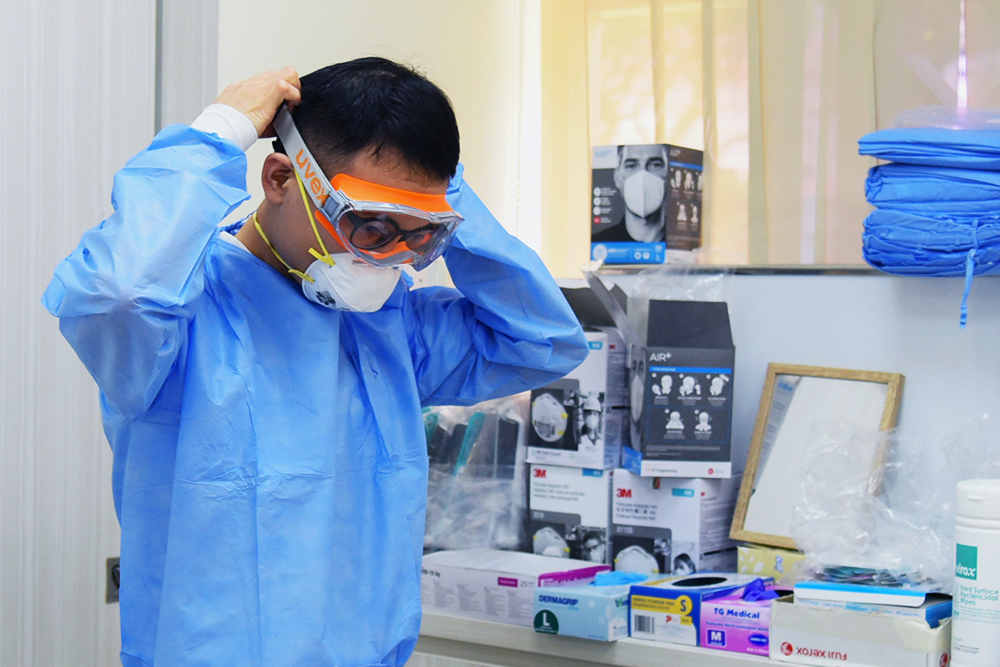 The pandemic situation is difficult. The cabinets are full of various personal protective equipment in the gowning zone. There are also small mirrors for medical staff to adjust their mask, goggles and protective cap.
The pandemic situation is difficult. The cabinets are full of various personal protective equipment in the gowning zone. There are also small mirrors for medical staff to adjust their mask, goggles and protective cap.
Before the pandemic, Dr Tan usually saw an average of 16 patients in one morning. Now, he has to squeeze out time to conduct COVID-19 swab tests and provide medical consultations for an extra eight patients. That is an increase of 50%!
Dr Tan had to perform swab tests for 16 people during the peak period in one morning. The queue of patients was incessant, adding to the bulging crowd waiting for consultation and testing. The number of confirmed local cases was close to 20,000 daily and rose shortly after the Chinese New Year break. He said: "Seeing how the number (of registered appointments) kept increasing made me flustered. So I could only ask my colleagues to help me while I kept conducting swab after swab. There were just too many cases."
After that day, the clinic set a limit on the number of swab tests per day. Those without an appointment were requested to return to the clinic in the afternoon or go to another clinic for testing. But Dr Tan exasperated helplessly: "Actually, the other community clinics are equally full, but we have to reject; otherwise, none of us would have time to eat."
After holding out the nine busy hours, Dr Tan had to seize the “free time” before getting off work to submit the swab test results to the Ministry of Health. His physical and mental health became badly affected after working in such a mode for a prolonged period. “Every morning, I have to race against time with some days busier than usual. And I have to submit test reports before getting off work. This cycle repeats itself every day, and I am burned out.”
Striving to keep Health at our Threshold
Dr Edwin Lim, Medical Consultant (Head of Medical Services Department) of Tzu Chi Foundation (Singapore), admitted that maintaining sufficient medical staff during the pandemic has always been the biggest challenge at hand.
Back in the early days of the pandemic in 2020, when the government announced the launch of the PHPC scheme, Dr Lim held a meeting to discuss with the medical staff, and they reached a consensus to join the scheme very quickly. He was grateful to his colleagues for forging ahead. He said: "No one objected, and everyone agreed that we must do it (join the scheme). Nobody was intimidated by the virus. This is indeed what we must do. Community clinics must provide support and stop the spread of the virus."
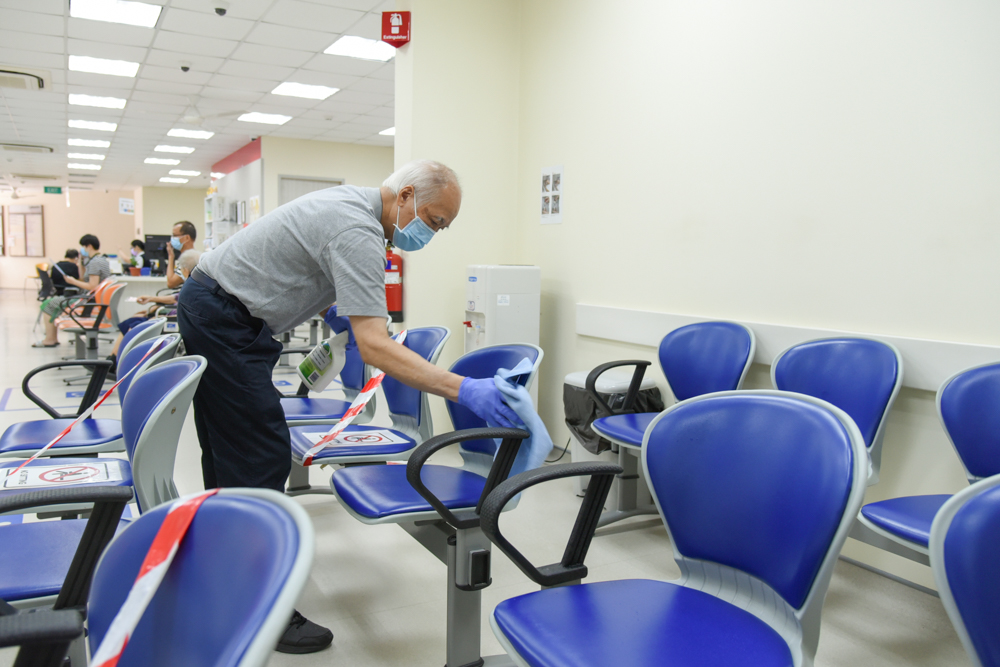
Clinic staff disinfect and clean the waiting area at least twice a day.
After going through adjustments and training, the screening room set up in the clinic gradually took shape. However, the working environment in the screening room carries with it risks and challenges. Thus, Dr Lim assigned this duty to staff who are healthy and have no elderly or children at home. Together with the official data from the government, he quickly allayed any fear.
He said: "While the personal protective suit protects us but it is also humid. It makes us sweat easily. And the one-piece suit makes going to the bathroom a problem. (But) no one was compelled. The most important thing is to let everyone understand that as a clinic, as a member of Tzu Chi, we do it because it is the right thing to do.”
However, Dr Lim also admitted that this year, the clinic is severely understaffed under the impact of Omicron. He revealed that the front desk staff who contracted the virus in February and recuperated at home decided to work from home to share the workload after learning about the massive increase in patients and manpower shortage.
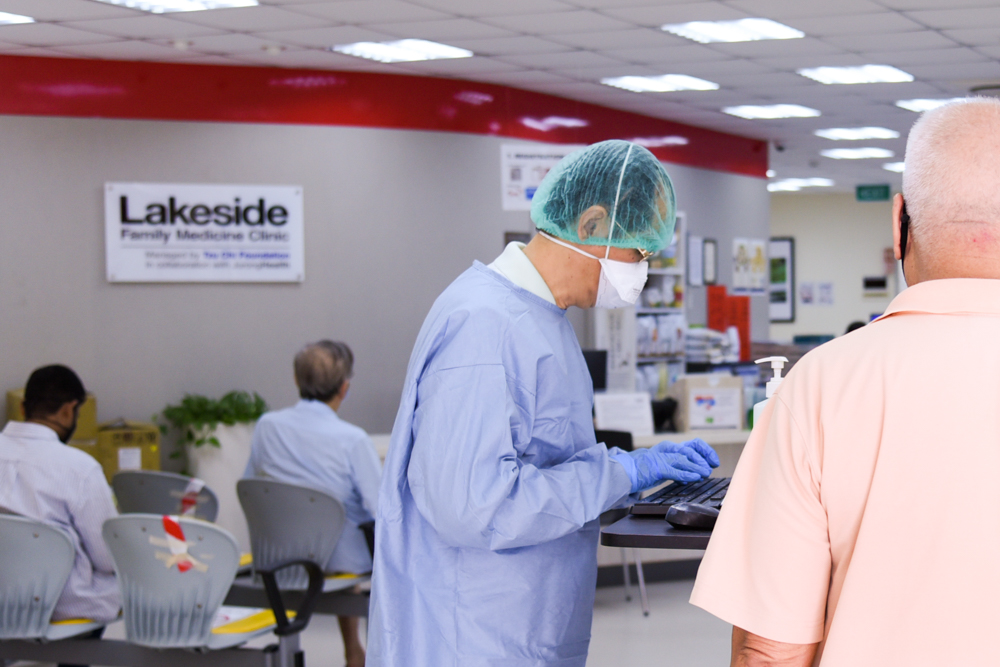
Stepping into the clinic, one will be asked if they have acute respiratory symptoms and be directed accordingly. The entire clinic is clearly demarcated and direction laid out visibly. Though there is a constant flow of people, it is in an orderly manner.
The Test for the Community Frontline Caregivers
On the one hand, a community clinic has to meet the community’s needs. On the other hand, it has to manage the referral of acute and critical illnesses. Thus, community clinics play an essential role in filtering and directing COVID-19 patients to the hospitals. As the pandemic evolves, government policies are adjusted accordingly, so community clinics play a critical role in communicating the approaches to the public.
Dr Ho Xin Qin, a resident doctor at the Lakeside Family Medicine Clinic, gave an example of such communication. After the Disease Outbreak Response System Condition’s level (DORSCON) was raised to orange, the government stipulated that all patients with acute respiratory symptoms would be given five days of sick leave. Such patients were not allowed to step out of the house. She said that many patients could not understand the policy and even "bargained" with her. These situations required general practitioners to try their best to explain and assuage their patients.
Dr Ho said: "Some parents who brought their children who caught a cold to see a doctor were initially reluctant to accept the sick leave. They even requested us not to give five days (sick leave) because the parents needed to work and could not stay at home to look after the children."
"But we had to insist and try to let them understand the situation. Although it was inconvenient to take so many days of sick leave, it would help the whole society to fight the pandemic. The parents would cooperate after listening to our explanation. They just needed a little time to understand."
Though Covid-19 is still raging and commands our attention, it is not the only disease in the world. There are still many medical conditions that require assistance. When the demand for swab tests increased, it inevitably stressed the resources needed for other medical situations. For example, waiting time for a patient became longer, but consultation time was reduced.
Dr Tan explained that more than half of the patients are elderly with one or more chronic diseases who need long term medical care and attention. Over the years, community doctors not only possess a strong understanding of their patient's health and medication problems but also insight into the patient's family situation.
He said that before the pandemic, he would be "slower and gentler" during consultations. But now, he can only focus on the key points as he does not have time and would want to treat the health condition quickly. Dr Tan also does not wish the patients to stay too long at the clinic. After all, clinics are high-risk places.
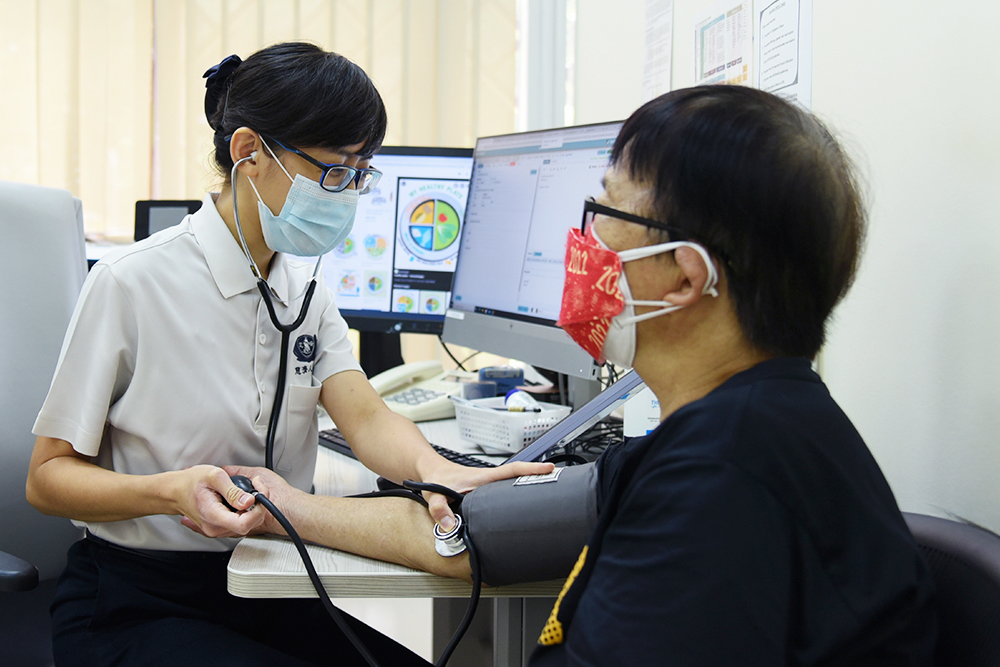 The pandemic situation evolves rapidly a, and policies are adjusted in tandem. Dr Ho (left), a resident doctor, said that the public might not be able to keep up with the constant changes. Patients require the explanation and assurance of medical staff.
The pandemic situation evolves rapidly a, and policies are adjusted in tandem. Dr Ho (left), a resident doctor, said that the public might not be able to keep up with the constant changes. Patients require the explanation and assurance of medical staff.
Telemedicine being a New Trend
Lakeside Family Medicine Clinic started providing telemedicine services after the pandemic outbreak. Dr Tan noticed that the elderly are willing to try such online medical consultations.
It became apparent that telemedicine has solved the problem of patients worrying about visiting the clinic and the risk of social gatherings during this pandemic. Dr Tan also noticed that a visit to the doctor is an ordeal for the elderly or patients with mobility problems. Moreover, some patients only require renewal of medication and not consultation. Telemedicine at home is the best option for such patients, as they can get a prescription or have the medicines sent to their homes.
He further explained that many Lakeside Family Medicine Clinic patients have their blood glucose meters or blood pressure monitor. If other vital signs (such as heartbeat) or more detailed blood test reports are required, the clinic can also arrange for nurses to collect blood samples for testing at the patient’s home. The nurses can even assist the elderly familiar with technology or without family support to conduct video consultations with doctors.
Dr Lim added that besides telemedicine, the pandemic has also escalated other new medical trends such as home medical care and telerehabilitation.
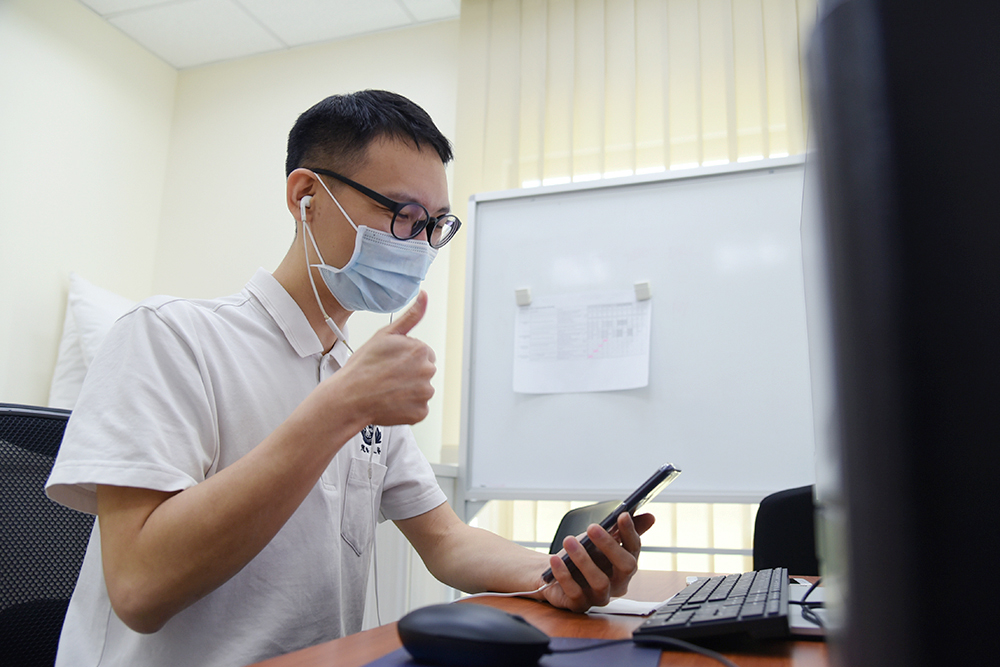 Despite a busy and heavy workload, Dr Tan would forget all his worries and turn into a kind and friendly doctor when he began his telemedicine session.
Despite a busy and heavy workload, Dr Tan would forget all his worries and turn into a kind and friendly doctor when he began his telemedicine session.
At the time of the interview, the local COVID-19 cases have dropped, and the situation has stabilised. However, all the staff are still busy. Knowing that the challenges are far from over, Dr Tan hopes to treat every patient equally and truly understand their sufferings. He then told the journalist: "No matter how tired I am in the afternoon, I must adjust my mind to treat every patient the same until the last patient."
Note: All the activities and photos in the article are in accordance with the safe management measure at that time.



